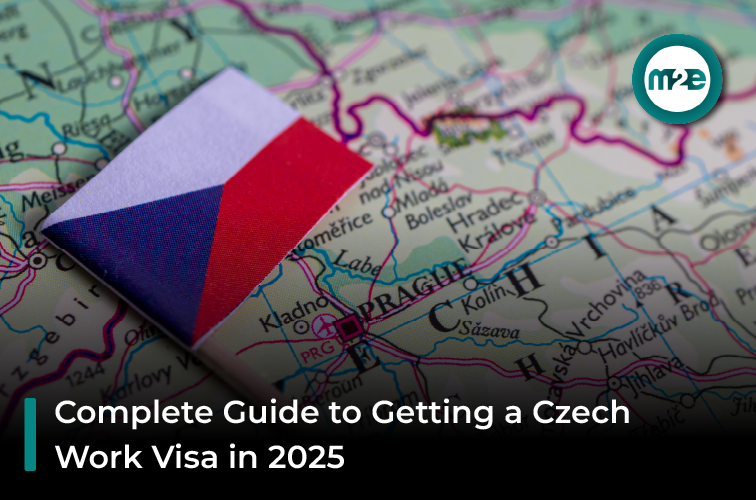
Complete Guide to Getting a Czech Work Visa in 2025
The Czech Republic has become one of Europe’s most attractive destinations for foreign workers. With its strong economy, central location, and growing demand for skilled professionals, thousands of non-EU citizens apply every year for a Czech work visa. Whether you’re an engineer, IT specialist, healthcare worker, or freelancer, knowing the visa process is crucial to secure legal employment.
In this guide, we break down everything you need to know about the Czech Republic work visa in 2025—from requirements to processing times, extensions, and family relocation.
Need step-by-step guidance for European immigration?
Connect with Moving2Europe.eu — Europe’s No. 1 overseas immigration consultancy — for expert, end-to-end support on your journey to work and live in Europe.
Do I Need a Visa to Work in the Czech Republic?
The answer depends on your nationality:
- EU/EEA and Swiss citizens: You do not need a visa or work permit. You can work freely but must register with the local Foreign Police if you plan to stay longer than 90 days.
- Non-EU/EEA/Swiss citizens: You must apply for a work visa or residence permit before beginning employment. Entering the country on a tourist visa and working illegally can lead to fines, deportation, and bans.
In short: If you are from outside the EU, you must secure a work permit before moving to the Czech Republic for employment.
Types of Czech Republic Work Permits
The Czech immigration system offers several visa categories depending on your qualifications and type of work. The most common are:
- Employee Card
- Designed for non-EU citizens working in jobs where there is labour demand.
- Valid for up to 2 years and renewable.
- Allows long-term residence linked to employment.
- Blue Card
- For highly qualified professionals with a university degree.
- Requires a minimum salary threshold (typically 1.5 times the average Czech gross salary).
- Grants access to the EU labour market after 18 months.
- Work Permit (Short-Term or Seasonal)
- Issued for temporary or seasonal work.
- Usually valid for up to 6 months.
- Intra-Company Transfer Card
- For employees transferred within multinational companies.
- Covers managers, specialists, or trainees.
- Business Visa / Trade License (Živnostenský list)
- For freelancers, digital nomads, or self-employed workers.
- Applicants must register with the Czech Trade Licensing Office.
Applying for a Czech Republic Work Visa
The application process involves both you and your future employer. The steps are:
- Secure a Job Offer
- A Czech employer must agree to hire you. The job should ideally be listed in the Central Register of Vacancies available for foreign workers.
- Prepare Documentation
- Application form (completed in Czech or English).
- Valid passport with at least 6 months’ validity.
- Employment contract signed by both parties.
- Proof of accommodation (rental agreement or housing confirmation).
- Recent passport-size photographs.
- Criminal background certificate (apostilled/legalized).
- Health insurance proof covering your stay.
- Submit Application
- Applications are lodged at the Czech Embassy or Consulate in your country of residence.
- Biometric data may be collected at submission.
- Pay Fees and Attend Interview
- Employee Card: approx. CZK 5,000 (€200).
- Blue Card: approx. CZK 5,000–7,500.
- Fees vary depending on nationality and visa type.
- Wait for Decision
- The Czech Ministry of the Interior and Ministry of Labour review the application.
- If approved, you will be granted a long-term visa for employment.
Czech Republic Work Visa Processing Time
- Employee Card: 60–90 days (sometimes longer due to high demand).
- Blue Card: 90 days on average.
- Seasonal Work Permit: 30–60 days.
- Intra-Company Transfer: 60 days.
Tip: Always apply several months before your intended start date, as delays are common in busy consulates.
Czech Republic Work Visa Requirements
To qualify, applicants must generally meet these requirements:
- Be at least 18 years old.
- Hold a valid employment contract with a Czech employer.
- Provide proof of accommodation in the Czech Republic.
- Have a clean criminal record.
- Present valid travel health insurance.
- Show financial means to cover initial stay.
- Meet qualification requirements for the specific job role.
Duration of a Czech Republic Work Visa
- Employee Card: Up to 2 years, renewable.
- Blue Card: Up to 2 years, renewable, with pathway to EU mobility.
- Work Permit (Seasonal): Up to 6 months.
- Business Visa: Usually 1 year, renewable.
After 5 years of continuous residence, applicants may qualify for permanent residency.
Extending a Czech Republic Work Visa
If your contract is extended or you change employers, you must apply for a visa extension before your current permit expires. Requirements include:
- Updated job contract.
- Continued proof of accommodation.
- Confirmation from your employer.
- Valid health insurance.
Failure to extend before expiry may result in cancellation of your right to stay.
Czech Republic Digital Nomad Visa (Freelancers)
The Czech Republic is becoming a hotspot for digital nomads and IT freelancers. While there is no official “digital nomad visa,” you can work under:
- A Business Visa (Long-Term Visa for Business Purposes).
- A Živnostenský list (trade license) for freelancers and contractors.
In 2025, the Czech government is expanding its framework to attract remote workers, especially in IT, design, and digital services.
Bringing Your Family Along
Family reunification is possible if you hold a long-term residence permit (Employee Card or Blue Card). Eligible dependents include:
- Spouse or registered partner.
- Children under 18.
Family members are entitled to healthcare and education. Some may also apply for work or study permits after arrival.
Things to Know About Working in the Czech Republic
- Job Market: High demand in IT, engineering, construction, healthcare, and manufacturing.
- Work Hours: Standard is 40 hours per week, with 20 days’ paid leave annually.
- Language: Many international firms use English, but Czech language skills improve employability.
- Living Costs: Affordable compared to Western Europe; Prague is more expensive than smaller cities.
- Residency Pathway: After 5 years on a long-term permit, you may apply for permanent residency, and eventually Czech citizenship.
Frequently Asked Questions (FAQs) About the Czech Work Visa
1. How do I know if I need a visa to work in the Czech Republic?
If you are a non-EU, non-EEA, or non-Swiss citizen, you will need a valid work visa or residence permit before starting employment in the Czech Republic.
2. What is the difference between an Employee Card and a Blue Card?
An Employee Card is for general employment in the Czech Republic, while the Blue Card is for highly qualified professionals with a university degree and higher salary thresholds.
3. How long does it take to process a Czech work visa?
Processing times vary: an Employee Card usually takes 60–90 days, while a Blue Card can take up to 90 days. Seasonal permits are faster, around 30–60 days.
4. Can I change jobs while holding an Employee Card in the Czech Republic?
Yes, but you must notify the Ministry of the Interior. In some cases, approval from the Labour Office is also required before starting with a new employer.
5. What documents are needed for a Czech work visa application?
You will need a valid passport, job contract, proof of accommodation, health insurance, financial means, criminal background check, and passport-size photos.
6. Can my family join me in the Czech Republic while I am on a work visa?
Yes, family reunification is possible for spouses and dependent children if you hold an Employee Card, Blue Card, or long-term residence permit.
7. How long is a Czech work visa valid?
Employee Cards and Blue Cards are typically valid for up to 2 years, while seasonal permits last up to 6 months. All can be extended if employment continues.
8. Is there a Digital Nomad Visa for freelancers in the Czech Republic?
Currently, there isn’t a separate digital nomad visa, but freelancers and remote workers can apply for a business visa (long-term) or operate under a Czech trade license (Živnostenský list).
9. Can I apply for permanent residency in the Czech Republic?
Yes. After 5 years of continuous residence on a long-term permit, you may apply for permanent residency. After that, you may also qualify for Czech citizenship.
10. What industries have the highest demand for foreign workers in the Czech Republic?
The most in-demand sectors include IT and software, engineering, manufacturing, construction, healthcare, hospitality, and logistics.
Need step-by-step guidance for European immigration?
Connect with Moving2Europe.eu — Europe’s No. 1 overseas immigration consultancy — for expert, end-to-end support on your journey to work and live in Europe.












